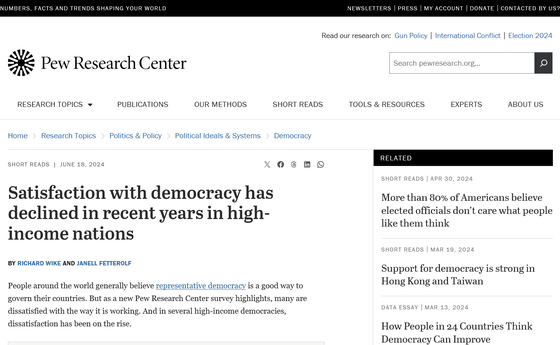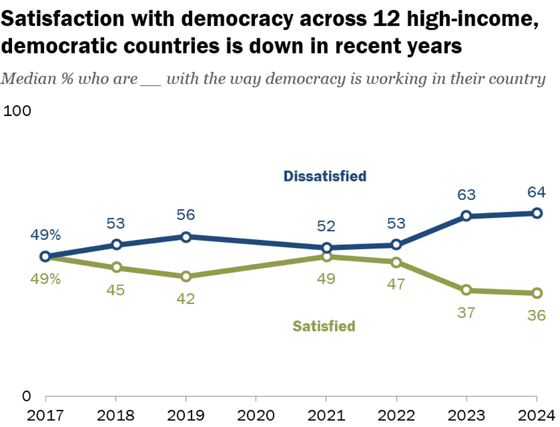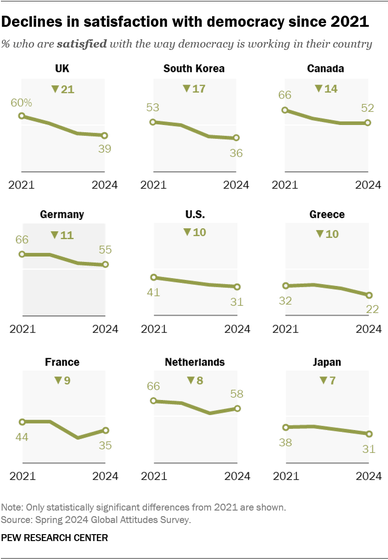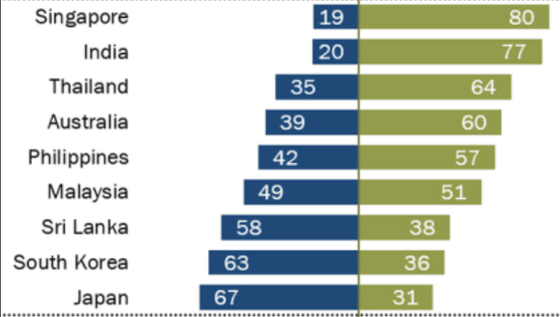Satisfaction with democracy in high-income countries such as Japan has declined in recent years

A 2024 survey conducted by
Rising dissatisfaction with democracy in high-income nations | Pew Research Center
https://www.pewresearch.org/short-reads/2024/06/18/satisfaction-with-democracy-has-declined-in-recent-years-in-high-income-nations/

Since around 2017, the Pew Research Center has designated 12 countries - Canada, France, Germany, Greece, Italy, Japan, the Netherlands, South Korea, Spain, Sweden, the UK, and the US - as 'economically advanced democracies' and asked the citizens of each country how satisfied they are with the current state of democracy in their country. Below is a graph showing the 'satisfaction with democracy' responses from 2017 to 2024, with the blue graph showing the percentage of people who answered dissatisfied and the green graph showing the percentage of people who answered satisfied. The graph shows a decline in satisfaction from 2017 to 2019, but the Pew Research Center points out that satisfaction has recovered in 2021 due to the COVID-19 pandemic.

However, dissatisfaction with democracy has been increasing again since 2021. In 2021, nearly half (49%) of respondents said they were 'satisfied with their country's democracy,' but in a June 2024 survey, this figure had fallen to just 36%.
Below is a graph by country of the nine countries that continue to ask questions among the 12 democracies surveyed by the Pew Research Center. According to the graph, satisfaction will decrease by 10 points or more in six countries - Canada, Germany, Greece, South Korea, the UK, and the US - between 2021 and 2024. Japan's satisfaction will decrease by 7 points between 2021 and 2024, the smallest rate of change among the nine countries.

In addition, in the survey conducted in spring 2024, interviews were conducted in a total of 31 countries, including 19 additional countries in addition to the 12 continuing countries. As a result, the median 54% answered that they were 'dissatisfied with their country's democracy,' and 45% answered that they were 'satisfied with their country's democracy.'
Looking at data for Asia, Singapore had the highest satisfaction rate at 80%, the highest among the 31 countries, while Japan had the lowest satisfaction rate in Asia at 31%.

According to the Pew Research Center, people's feelings about how their democracy works are closely tied to how they think the economy works: Across all 31 countries surveyed, people who rate their country's economy negatively are more likely to be dissatisfied with their country's democracy than those who rate it positively.
Additionally, in eight countries - Argentina, Chile, France, Germany, the Netherlands, Poland, Spain and the United States - people with lower levels of education are less satisfied with their country's democracy. Additionally, in Argentina, Chile, Colombia, Germany, Peru, Singapore and South Korea, adults under 35 are more likely to be satisfied with democracy than those over 50. Outside of these countries, there are few differences based on education level or age.
Related Posts:
in Note, Posted by log1e_dh







